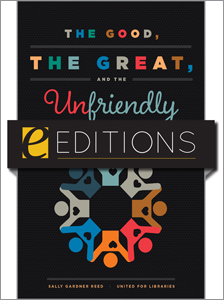
The Good, the Great, and the Unfriendly: A Librarian's Guide to Working with Friends Groups—eEditions e-book
The download link for this product can be found on the final confirmation screen after you complete your purchase, and may also be accessed from your Account Profile. For more information about ALA eEditions file types and how to view them on eReaders, desktop computers, and other devices, see this page.
Primary tabs
You don't need to be an ALA Member to purchase from the ALA Store, but you'll be asked to create an online account/profile during checkout to proceed. This Web Account is for both Members and non-Members. Note that your ALA Member discount will be applied at the final step of the checkout process.
If you are Tax-Exempt, please verify that your account is currently set up as exempt before placing your order, as our new fulfillment center will need current documentation. Learn how to verify here.
- Description
- Table of Contents
- About the authors
- Reviews
Former Executive Director of United for Libraries and former Executive Director of Friends of Libraries U.S.A., Reed has decades of experience liaising between Friends groups and the libraries that they support, serve, and (sometimes) exasperate. Her new book cuts to chase of building and maintaining these important relationships, showing not only how to effectively harness Friends’ goodwill and enthusiasm but also sharing tactful techniques for steering an ineffective or unfriendly group down the right path. Her pragmatic approach will resonate with public and academic library directors, volunteer coordinators, and other library staff who work with Friends. Written with knowing humor and focused on getting positive results, this book
- provides guidance for developing a Friends group for public and academic libraries;
- explains how to merge a Friends group with a foundation;
- gives pointers on encouraging Friends to attract new and active members, working with the Friends board to develop leadership skills, and other crucial partnership strategies;
- addresses the sticky situation of “unfriendly” Friends, with sage advice on handling Friends who seem unmotivated when it comes to fundraising or advocacy, are uncommunicative, overstep their bounds, and other difficult issues; and
- shares fundraising, advocacy, programs, and membership development best practices from Friends groups across the country.
Tailored specifically to librarians’ point of view, this book will inform and empower libraries to work effectively with Friends groups for greater fundraising, engagement, and advocacy outcomes.
Acknowledgments
Chapter One: How to Start a Friends Group (and Why You Should)
Chapter Two: Engaging Active New (and Younger) Friends
Chapter Three: Merging Friends and Foundations
Chapter Four: Engaging Your Friends in Advocacy
Chapter Five: When Friends Go Rogue
Chapter Six: Ideas to Steal—Taking Your Friends from Good to Great!
Appendix A Sample Memorandum of Understanding
Appendix B Advocacy Campaigns Legal Limits on Spending for Non-Profits
Appendix C Sponsorship and Gift Acceptance Policy
Appendix D Understanding Roles Chart
Appendix E Guidelines for Giving
Appendix F Making the Case for an Academic Friends of the Library Group
Appendix G Library Support for Friends Activities
Index
Sally Gardner Reed
Sally Gardner Reed is fomer Executive Director of United for Libraries, a division of the American Library Association. United for Libraries provides support, education, and consultation to those groups affiliated with their local libraries to help increase and maximize their support—such as Friends, Trustees and Foundation members—along with library directors who work with them. Prior to the position, she spent nearly 20 years in library administration. She is the author of several books on library management, advocacy, volunteering, and fundraising, as well as numerous articles for professional library journals. She has presented programs and workshops to hundreds of Friends of Library groups, library boards, and librarian groups, nationally and internationally. She was the 2000 recipient of ALA’s Herbert and Virginia White Award for promoting libraries and librarianship, and was honored with the 2018 Joseph W. Lippincott Award for her distinguished service to the profession.
United for Libraries
United for Libraries, a division of the American Library Association, supports those who govern, promote, advocate, and fundraise for libraries, and brings together library trustees, advocates, friends, and foundations into a partnership that creates a powerful force for libraries in the 21st century. For more information, visit www.ala.org/united.
”Reed breaks down the reasons for forming, working with, merging, and even splitting up with Friends groups into digestible chunks. With a conversational, if not downright conspiratorial, tone, she speaks directly to her audience in plain language and addresses common concerns throughout the book … The appendixes provide truly useful information, from a sample memorandum of understanding to information about nonprofits; much of her advice is useful outside of Friends groups as well.”
— VOYA
”Straightforward, practical advice."
— Library Journal
"The use of real-life examples enlivens the text ... This book will inspire those library professionals and community volunteers seeking to enhance library advocacy and community engagement. Recommended."
— ARBA
"There is so much useful information in this book that it can be used as a reference manual for established friends groups or as a starting point for those considering a friends group ... Without a doubt, this is a book that will be continually used even if just for outreach/ marketing purposes; it is pure pragmatism with a sense of humor."
— Catholic Library World


